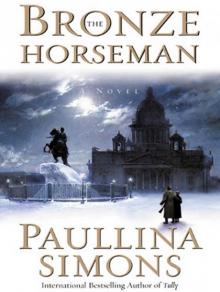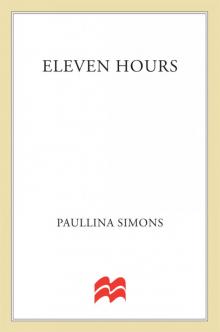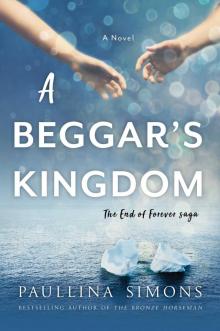- Home
- Paullina Simons
Road to Paradise Page 2
Road to Paradise Read online
Page 2
“Uh—no.” I resumed rummaging.
“Well, he went back to California. His mom’s sick, so he went to be with her. He’ll graduate with an equivalency diploma; he says it’s just as good, and anyway he says he doesn’t need a piece of paper to be a success, he’s very smart, well, I don’t have to tell you, you know.” She paused. I said nothing.
“I watched you out there today, that was amazing, did you run the 440 in fifty-seven seconds?”
That made me look up. “You watched me? Why?”
“Why? You were incredible, that’s why. Remember when we first started to train, you couldn’t run the two-mile in seventeen minutes? What’s your time now?”
I stared calmly at her. “Time’s five to five and I’ve got to get home.”
“Oh, yes. Ha ha.”
Ha ha? She was small and busty, and slightly plump in the stomach. She had long, straight light-brown hair, and used to have a terrible nervous habit of plucking out her eyebrows and eyelashes. When she ran out of hair, she’d pluck the hairs from her scalp. She wore tight jeans and high heels. She wore no underwear. She used to be my best friend.
But that was a while ago.
“I don’t want to keep you,” she said, “but while you’re getting dressed, can I talk to you?”
“Go ahead.” I gave up on the stupid bra; the one I’d worn running was damp, and I suspected I hadn’t brought another. Damn.
My palms pressed against my breasts, I stood in front of her.
“Look how skinny you got, Sloane,” Gina said. “You must be training a lot.”
If I didn’t run I’d be prone to child-bearing hips, but I was always running. I said nothing.
“I heard you were going to California after graduation.”
“You heard that, did you? So?”
“Are you or aren’t you?”
“What’s it to you?”
“Well, if you are, I was wondering if you’d like some company.” She continued before I had a chance to vigorously shake my head. Actually, she continued as I was vigorously shaking my head. “I’d split the expenses with you.” She saw my head spinning from side to side like a pendulum on coke. “And we could share the driving,” she offered. “We’d get there in three days if we did that. How many miles is it? Like a thousand?”
“Three thousand to where I’m going,” I said coolly.
She tried to whistle. “Long way. Well, like I said, I’d help drive, split the gas, and the hotels, you know, it’d be cheaper.”
I was quiet. “You know what’s cheaper?” I said. “Taking the bus. If you take the Greyhound, it’s only a few hundred bucks.”
Gina hemmed and hawed. Finally she said she was scared of buses. Then admitted her mother was scared of buses. I didn’t like buses much myself, but I really wasn’t interested in her or her mother’s opinion of the Greyhound.
“Look, I really gotta go. Emma’s waiting.” Opting for no damp bra, just a T-shirt, breasts poking out, hair wet, jeans barely buttoned, I grabbed my stuff.
She followed me, clutching my arm, but when I gave her a long look, let go. “Promise you’ll think about it?” she said, stepping back. “Just think about it, that’s all. It’ll be easier and faster for you. It’ll be better. And we won’t have to talk much—if you don’t want. We can just listen to eight-tracks.”
Damn Emma. Damn car. Damn ideas. I vowed to just tell her no. Sorry, Geeena, I thought about it, and I don’t think it’s a good idea.
I was wary of her and her intentions. I was wary of her the way some people are of otters. Or leopard seals.
Gina is so ethnic-sounding, like Larchmont. Larchmont may be pretentious, but there is nothing pretentious about Gina.
In the statistics for the most popular names in the last twenty years, Gina has appeared in the top fifty every year. Gina, when she heard this, said, “Groovy!” And flung back her hair. All the boys think Gina is Italian, but there’s not an ounce of Italian blood in her. She just has an ethnic name. I don’t know why this bothers me, except perhaps because every time we went to the amusement park or the beach and the boys would hear her name, their smile would get bigger and they’d drawl, “Ohhhh, you’re Eyetalian . . .” as if being Italian endowed her with some special gifts, gifts I clearly did not possess. You know what wasn’t lost on me? Their expressions. “Geeeeeena,” they’d call, and every time they did, my irritation quotient twisted up.
I, on the other hand, can only wish I had an anachronistic or ethnic name. Instead mine is just androgynous. Mine isn’t a name, it’s a last name. I’m epicene. Not one thing, not the other.
Whatever it is, you can be sure that not once, not a single time, not when high on Ferris wheels, or dancing in clubs or swimming in the Sound, has any boy ever drawled out my name, with their eyes widening. “Shelbeeeeeee . . .”
Shelby. This is who I am. Here is my name. I am Shelby.
Gina approached me again the following day. “Are you still thinking?”
“It’s only been a day!”
“Soon summer’ll be over.”
“It’s barely June.”
“I gotta know. I gotta know if I need to make other plans.”
“Okay. I think you should make other plans.”
“Come on, Sloane.”
Sloane! “If you need to know now, my answer is no ’cause I haven’t thought about it.”
“But we’re graduating in two weeks!”
“I know when we’re graduating.”
She lowered her voice. “I gotta make tracks. I gotta get to some place called Bakersfield. I just have to. Don’t ask, okay?”
“Um—okay.” Like I’d ask.
“I have to know soon,” she said, beseechingly. “Because if we’re going, we have to make a plan.”
It was as if she had said a magic word. It was better than please. My whole face softened. “Plan?” I loved plans. I liked to think of myself as a planner.
“Yes. I have to tell my boyfriend when I’m arriving.”
Frowning, I stepped away from her. “That’s the sum total of your plan? Notifying other people?”
She didn’t know what I meant, and frowned, too. I really had to get to my Urban Public Policy class. “What else is there?”
I said nothing. What else was there?
“What? Going cross country? Oh, please.” She waved her hand dismissively. “We get in the car. We go.”
“What about gas?”
“When we run out, we get some.”
“I posit that when we run out, it will be too late.”
“So we’ll get some before. Shel, I’m telling you, you’re overthinking this.”
Ugh. I shook my head. Underthinking, clearly. “I’m not headed to Bakersfield.”
Gina blinked at me. Her blue eyes were slightly too close together, and when she stared, it made her seem vacant and cross-eyed. Perhaps I was being less than totally kind since she was pretty, and all the boys thought so. She was no slouch in the looks department, looked after herself and wore tight jeans, there was just something slightly blank about her eyes when they stared.
“I gotta go. Look, even if I agree to do this,” I said, pressing my books to my chest like palms to my breasts, “you’re going to have to take a bus to Bakersfield. I can drop you off in San Francisco, but then you’re on your own.”
“You want me to take a bus?” Gina said as if I were asking her to eat pig slops.
I moved to go. She caught up with me. “Listen,” she said. “Please say yes. I won’t be able to go without you.” She lowered her voice. “I really need to get to Bakersfield as soon as poss. And Mom won’t let me go unless I go with you.”
“Your mother won’t let you go? What are you, five?”
“That’s what mothers do, Shelby,” said Gina, pompously. “They care what happens to you.”
God! What she didn’t say was, you’d know that, Shelby, if you had a mother.
2
Emma
I w
as raised in a souped-up boarding house near Mamaroneck, New York, a four-star boarding house, which is akin to saying a sirloin burger. It’s still a burger. Actually, the house I lived in was in Larchmont, next town over, but I enjoy saying Mamaroneck, because it has the word Mama in it, and I don’t like telling people I come from Larchmont, as it carries with it a superior tag I don’t much care for. You have to have a French accent to pronounce it properly. Larsh-MOH. People who don’t know won’t understand, but people who know raise their eyebrows and say, “Oh, Larchmont. Wow.” It is for them I say I live near Mamaroneck. Nobody ever raises their eyebrows at that. It’s suburban sounding, not French sounding, unpretentious, not posh—all the things you can’t say about Larchmont, a cosmopolitan, sophisticated, old-world European city in the middle of parochial, provincial suburban America. The streets are winding and canopied, the houses Tudor, compact and esoteric, with square rooms, hardwood floors, and tiny kitchens, a town where the Christmas lights get strung up for December down Main Street and twinkle merrily in the snow. Many houses are for rent, and there is one particular furnished Tudor, off Bridge Street, on a cul-de-sac (even that’s French) where Emma and I live in three small rooms above the garage that stands on a driveway overhung by enormous trees that drip sap in the spring and fall, staining my running shoes. We live there for free, but the way washing machines and vacuum cleaners live for free. In exchange for our rooms, we maintain the house. Mostly Emma does this. I help out on the weekends.
I live with Emma. Her last name is Blair. And mine is Sloane. These things I know.
Now for all the things I don’t know. I don’t know who Emma is, why I live with her, or who she is to me. When I was a child, I used to call her Aunt Emma, but then I grew up. Always, since then, she has been just Emma.
I also know this. And I only found out because Gina’s friend, the ridiculous and bug-eyed Agnes Tuscadero, eavesdropped on her parents’ very private kitchen conversation late one night a few years ago. Apparently my father, Jed Sloane, while married to my mother, took up with a woman who they think was named Emma, who might or might not have been my mother’s sister/aunt/best friend. So the reason I don’t have a mother is because of Emma. My mother split, leaving me with Dad and his new mistress/lover/fling. Agnes’s parents gossiped and Agnes told Gina who told me that my mother left a letter saying, I know all you ever wanted was your smokes and your drinks and your whore. Well now you can have them. My life and everything in it was a complete waste of time. My mother wrote that, I presume, sometime before she left me.
I don’t know where this letter is, and believe me, that’s not for lack of looking. Every crevice of every drawer in our two rooms and a living room, I have scraped through, searching for it, wanting to see her handwriting, and her name. Haven’t found it—yet.
Now, I don’t know what my mother looked like, but I know what Emma looks like, and I find it surprising, to put it euphemistically, that any man would leave home for a woman like Emma, who, with her thick ankles, square low-heeled shoes, gray stiff helmet of hair, and matronly dresses, couldn’t engender passion in a rutting stud dog, much less a male human being. She simply seems too Puritan for love of any kind.
What’s interesting, in a purely academic way of course, is that my father also left. I assume it was soon after my mother because I don’t remember him. What’s odd is I do remember her, a pale ghost with warm arms. He left and then died somewhere on the road. That’s all Emma told me, wanted to tell me; that’s all I asked, wanted to ask.
Agnes told Gina who told me he did not leave a letter. Jed Sloane left, died, and left me with “the whore.”
And she raised me.
Who was my father?
Who was my mother?
And if Emma is no good, and my father left her, why am I still with her?
More important, why is she still with me?
Does she feel guilt over me? Do I ask this of her when we’re cleaning the bathrooms of the French U.N. diplomats?
Emma, my father left; why did you stay?
My mother left; why did you stay?
Can you answer me as we wax the floors and cut up onions?
If they all went away, walked away, why didn’t you walk away?
I cannot fathom what her answers might be.
Eventually I began to feel that the time for questions had sort of passed; nonetheless, I felt that every day I had to tread carefully, to make sure I walked around the gullet where the fragments of answers had fallen.
Question: irretrievably fallen?
But I have this to add in conclusion. My friend from across the road, Debbie, had been spending a lot of time with us this year. She had two parents, a mother, a father, three brothers, a Beagle; her mother was home with the kids, her dad worked as a manager at the Larchmont hardware store. And yet Debbie, who had a whole family plus pet, was over with petless me and Emma; why? She helped us in the evening, watched TV, and though she lived across the street, would often ask if she could stay over. Emma always said yes. Just yes. No less, no more. Yes.
A few months ago, Debbie finally told me that her father was sick. Our neighbor, Ralphie, was driving him every week to the hospital. Turned out his liver was shot. He needed a transplant in a hurry but couldn’t get one despite having a wife, four kids and no job: he was a drunk, and no one gave fresh liver to alcoholics. So he would drink, scream at his wife and kids, and be sick. When he was sober, Ralphie drove him to the hospital for kidney dialysis and tests. Debbie’s dad was a drunk for twenty years. Ralphie drove him to the hospital for his last two months. One day Debbie’s dad didn’t come home from the hospital, and Debbie’s mom took Debbie and the one brother who was still home and left, possibly for Florida. I missed them when they went. They had seemed like such a nice family.
Emma and I get up at six and prepare the house for morning. We work silently. I make the coffee, she empties the dishwasher, we wipe down counters, I take out the trash. My bus comes at seven-thirty. Emma speaks then. “Do you have what you need?”
And I speak, too. “Yes.”
I took typing, so I could have one actual skill when I graduated. I got a D-minus. I do my homework during my free period because at home there’s too much to do. After track I take the late bus and help Emma with dinner, with cleanup, with laundry. Our work is done by eight. The Lambiels like us because we’re quiet, and they’re quiet. The husband is a diplomat and the wife a flight attendant; she’s never home, and he drinks the whole time she’s away. Their only child, Jeanne, a blonde all-that, went to our school for about five minutes, but then, feeling rather ignored by the people she held in such contempt, transferred to a private school for children of foreign diplomats. Certainly when I’m in her house, she doesn’t speak to me. Sometimes she says, “Shell-BEEEE, get us some pop cooorn, s’il vous plaît.”
Okay, so the French chick who can barely speak English drawls out my name like the boys at the ice-cream parlor when she wants me to fetch and carry. Nice.
Six days a week, three hours a day, I run. Our meets are Saturday afternoons. On Sundays, our day of rest, Emma and I cook for the week for us and the Lambiels so all we have to do Monday to Friday is heat stuff up.
If people ask, I say I’m a Christian because Christianity is the one religion where you don’t have to do anything to still be a member. I like that, and since I don’t want to say I’m nothing, I call myself a Christian.
I have never been inside a place of worship of any kind.
I have never had outside work. Emma’s been giving me a little money for helping her. I’ve saved five dollars a week for as long as I can remember, and last I looked, my bank account had $2,400 in it. My one continued expense has been my running shoes—new ones every three months. Emma pays half. My few leftover bucks go frivolously on hair gel, mascara and lipgloss, Milky Ways and Love’s Baby Soft.
Two weeks ago, Jeanne Lambiel was caught by her father stealing twenty dollars from his wallet when she wanted to go out with
her passé French friends. He screamed at her for half the night; the whole neighborhood heard him. Why would you steal from me, he kept yelling. Why? You have thirteen million in your trust fund! And Jeanne said calmly, “Yes, but, Papa, I needed not thirteen million but twenty bucks.”
I got away from Emma and the Lambiels by running. I’ve been cross country and track and field from the time I was ten. I run the mile and the two-mile. Once I ran the mile so fast I had to go to the hospital. They thought I was dying. So much for go all out, try your best, do your best, stop at nothing. Give 110 percent. Well, I gave 110 percent and it almost killed me. So you can just imagine the kind of life lesson I took away from that: a little less than your best, Shelby Sloane—that will have to be good enough.
3
The Gift
On my eighteenth birthday in May of 1981, which happened this year to fall on a Saturday, Emma said, unduly excited (Emma never got even duly excited about things), “Come outside with me. I want to show you something.”
I followed her down the stairs and out. In the sap-covered driveway on this Saturday May day, parked behind the Lambiels’ government-issue Mercedes, stood a little yellow Mustang. I say little, but to me, it seemed gargantuan like a house, like an airplane hangar. A bright yellow hangar. It had two black stripes running over the roof and hood. It looked both classic and stunning, as if I knew anything about Mustangs. Except we once saw a documentary on them a few years back, and I might have mentioned that it looked like a cool-cat car, but what did I know, I was thirteen at the time, and Emma had been half asleep.
I stood silently staring.
“It’s for you.” She coughed. “You like it?” She looked alternately exquisitely excited and morbidly uncomfortable. I think she might have been uncomfortable about being so excited. “I wanted to get you something special. You know—for your eighteenth.”

 The Summer Garden
The Summer Garden Six Days in Leningrad
Six Days in Leningrad Bellagrand
Bellagrand Tatiana and Alexander
Tatiana and Alexander Road to Paradise
Road to Paradise The Bronze Horseman
The Bronze Horseman Eleven Hours
Eleven Hours Tatiana's Table: Tatiana and Alexander's Life of Food and Love
Tatiana's Table: Tatiana and Alexander's Life of Food and Love The Girl in Times Square
The Girl in Times Square The Tiger Catcher
The Tiger Catcher Lone Star
Lone Star Children of Liberty
Children of Liberty A Beggar's Kingdom
A Beggar's Kingdom Inexpressible Island
Inexpressible Island Tatiana and Alexander: A Novel
Tatiana and Alexander: A Novel Tatiana's Table
Tatiana's Table A Song in the Daylight (2009)
A Song in the Daylight (2009)